Plot summary
| | This section needs expansion. You can help by adding to it. (January 2023) |
| Stage Struck | |
|---|---|
| Directed by | Edward Morrissey |
| Written by | Roy Somerville |
| Produced by | Fine Arts Films |
| Starring | Dorothy Gish |
| Cinematography | Karl Brown |
| Distributed by | Triangle Film Corporation |
Release date |
|
Running time | 50 minutes |
| Country | USA |
| Language | Silent..English titles |
Stage Struck is a 1917 silent film drama directed by Edward Morrissey and starring Dorothy Gish. It was produced by Fine Arts Films and distributed through Triangle Film Corporation. [1] [2]
A copy survives in the Library of Congress collection and Cinemateca Brasileira, São Paulo, Brazil. [3] [4]
| | This section needs expansion. You can help by adding to it. (January 2023) |
uncredited

The Drop Kick is a 1927 silent film directed by Millard Webb, adapted from the novel Glitter (1925) by Katherine Brush, about a college football player. It was one of the early films of John Wayne who was only aged 20 in the film. He too played a college footballer.

My Baby is a 1912 American short comedy film directed by D. W. Griffith and Frank Powell. Prints of the film exist in the film archives of the Museum of Modern Art and the Library of Congress.
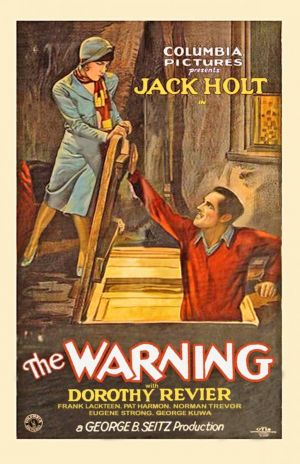
The Warning is a 1927 American silent drama film directed by George B. Seitz. A surviving print of the film is at George Eastman House Motion Picture Collection.

Remodeling Her Husband is a 1920 American silent comedy film that marked the only time Lillian Gish directed a film.

The Great Adventure is a 1921 American silent romantic comedy film produced by Whitman Bennett and distributed by First National Pictures, then called Associated First National. The film was directed by Kenneth Webb and starred Lionel Barrymore. Fredric March made his screen debut in this film. The film is based upon the 1908 novel Buried Alive by Arnold Bennett. It was remade in 1933 as His Double Life starring Lillian Gish. The Great Adventure is a surviving feature film held by the Library of Congress.

Blackbirds is an extant 1915 American silent film drama produced by Jesse Lasky and distributed through Paramount Pictures. The film marks an early starring screen appearance by actress Laura Hope Crews in this her second motion picture. The film is based on a 1913 Broadway play, Blackbirds, by Harry James Smith which also starred Crews. This is a surviving film at the Library of Congress.

Ladies Must Live is a 1921 American silent societal drama film directed by George Loane Tucker and released by Paramount Pictures. It was the last directorial effort of George Loane Tucker and was released four months after his death. Betty Compson stars along with Leatrice Joy, John Gilbert and Mahlon Hamilton. It was one of the few instances where future husband and wife Joy and Gilbert appeared in the same film.
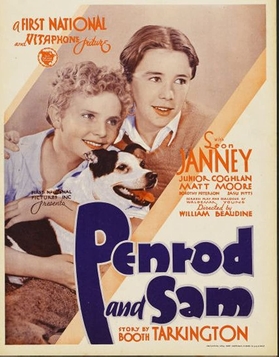
Penrod and Sam is a 1931 American pre-Code comedy film directed by William Beaudine and starring Leon Janney and Frank Coghlan Jr. It is an adaptation of the novel Penrod and Sam by Booth Tarkington. Beaudine had previously directed a 1923 silent version, and was invited to remake his earlier success.
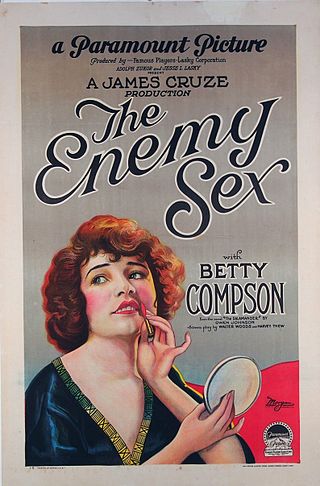
The Enemy Sex is a 1924 American silent drama film starring Betty Compson and directed by her husband James Cruze. It was produced by Famous Players–Lasky and released by Paramount Pictures. It is taken from the 1914 novel The Salamander by Owen Johnson.
Who Cares is a 1925 American silent drama film produced and distributed by Columbia Pictures and starring Dorothy Devore. It is based upon the 1919 novel by Cosmo Hamilton which had been previously filmed in 1919 as Who Cares?

Black Is White is a 1920 American silent drama film starring Dorothy Dalton and directed by Charles Giblyn. It was produced by Thomas H. Ince and distributed by Paramount Pictures. The movie is based on a novel, Black is White, by George Barr McCutcheon. The film's spelling differs from the spelling of the novel. The plot is one in which a woman stands almost any form of abuse from a man and finally forgives him at the moment she has opportunity for the revenge she has always sought, such stories being somewhat popular at the time.

The Satin Woman is a 1927 American silent drama film directed by Walter Lang and starring Dorothy Davenport, also known as Mrs. Wallace Reid. The film is preserved in the Library of Congress collection.
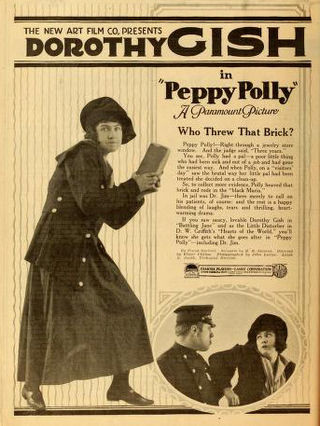
Peppy Polly is a lost 1919 American silent drama film directed by Elmer Clifton and starring Dorothy Gish. D. W. Griffith produced, as he did for several of Gish's films.

The Stronger Love is a 1916 American drama silent film directed by Frank Lloyd, written by Julia Crawford Ivers, and starring Vivian Martin, Edward Peil, Sr., Frank Lloyd, Jack Livingston, Alice Knowland, and Herbert Standing. It was released on August 13, 1916, by Paramount Pictures.

The House of Lies is a 1916 American silent film drama directed by William Desmond Taylor and written by L. V. Jefferson. The film stars Edna Goodrich, Juan de la Cruz, Kathleen Kirkham, Lucille Ward, Harold Holland and Herbert Standing. The film was released on September 14, 1916, by Paramount Pictures.

Love Me is a surviving 1918 American drama silent film directed by Roy William Neill and written by C. Gardner Sullivan. The film stars Dorothy Dalton, Jack Holt, William Conklin, Dorcas Matthews, Melbourne MacDowell and Elinor Hancock. The film was released on March 18, 1918, by Paramount Pictures.

Nugget Nell is a 1919 American comedy silent film directed by Elmer Clifton and written by John R. Cornish. The film stars Dorothy Gish, David Butler, Raymond Cannon, Regina Sarle, Jim Farley, and Bob Fleming. The film was released on July 27, 1919, by Paramount Pictures. It is not known whether the film currently survives.

The Scarlet West is a 1925 American silent historical drama film directed by John G. Adolfi and starring Robert Frazer and Clara Bow. It was distributed by the First National company.
The Children of the Feud is a lost 1916 silent film drama directed by Joseph Henabery. It was produced by D. W. Griffith and released through Triangle Film Corporation.
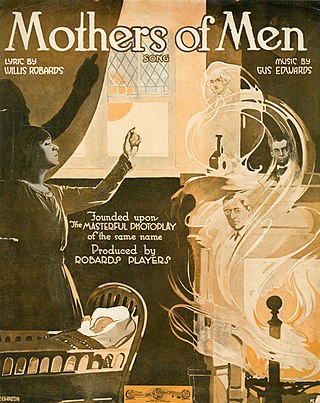
Mothers of Men is a 1917 silent film directed by Willis Robards, promoting woman's suffrage. The seven-reel drama is considered lost. A five-reel re-edited version also directed by Robards was released in 1921—following ratification of the Nineteenth Amendment—under the title Every Woman's Problem. This version survives through a single 35mm print preserved by the British Film Institute. The 1921 re-release was restored in 2016, in a collaboration between the BFI and the San Francisco Silent Film Festival.